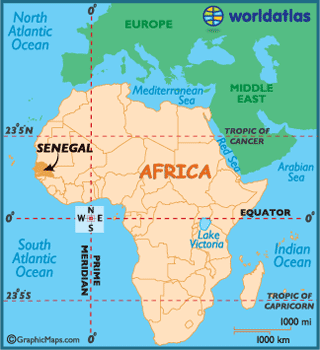I just found out I'm going to Senegal!
- Vickie Obenchain

- Dec 18, 2017
- 3 min read
Updated: Dec 27, 2017
To be honest, when I found out this was my placement, I didn't know too much about the country. So I started doing research!

Senegal a Jewel of Africa
"Senegal turns simpleminded assumptions and prejudice on their heads at every turn." - Anthony Bourdain
Just below the Sahara, Senegal is located on the Atlantic Ocean side of the African continent, and its capital, Dakar, is the western most city in Africa. The people of Senegal have a rich history, that has been influenced by many cultures. People have been living in the Senegal area for 15,000 years. The area was first populated by nomadic tribes, then once more people moved into an area, a larger West African Empire, the Ghana Empire, began to grow throughout the whole western sub-Sahara region. While most early history in this area was passed down from generation to generation through stories, prior to written language, many other advanced civilizations whose sailors or traders ventured though the area wrote about the Senegal area. These included many Greek, Roman, Persians and Viking navigators/sailors; they wrote about Senegal and its' people, culture, climate, resources, flora and fauna.
In the eleventh century, the religion of Islam came to Senegal as the Almoravids, a branch of Muslims, brought their armies into Senegal. Prior to this time, many people had worshiped gods of the natural world. As the Almoravids conquered areas along their trading routes, Islam was spread "by word and by sword" as the conquering armies imposed their religion on the conquered people. The Ghana Empire fought back, yet eventually were conquered and converted to Islam.
Europeans became interested in the area as stories of Gold made its way to them through Arab traders. In the 1400's Portuguese, were the first Europeans to trade with the Africans in the Senegal region. In the late 1500's the French, English and Dutch followed suit. These people traded goods and money for gold and slaves. From about 1500-1800 it is believed 200 million Africans were taken from Africa to be sold to slave traders to work on plantations in the Caribbean and in North and South America. The Senegal coast was referred to as the Slave Coast; as this is where slave-holding compounds began to spring up where slaves would be held before boarding boats to carry them to the Americas. After the French Revolution, ideas of freedom and equality spread. Yet it took a while for those ideas to penetrate Africa. In 1818, France abolished the slave trade; however, even though the slave trade was abolished, illegal participation in the slave trade in Senegal continued until about 1848.
Many permanent European settlements sprung up in Senegal. The French, however, authorized the official Senegal Trading company which created a monopoly for all trade in the area. In addition to slaves, trade in gum, gold, iron and with the fertile soil, cotton and groundnuts were introduced. The French maintained control of the area, even offering French citizenship and representation in the French parliament itself. During WWII however, the French people of the Vichy regime, which collaborated with the Nazi's treated the blacks of Senegal very badly. This hurt relations between the Senegalese people and the French. After the war, French was made more aware of the worth and validity of African culture.
In 1960 Senegal peacefully became its own independent country, lead by President Leopold Senghor, a Senegalese man, who was a French educated poet and political activist for Senegal.
Language:
Senegal is a small country, about the size of Nebraska with more than 7 million people living in Senegal today. Many people of Senegal speak both an African language, called Wolof and French. French is the national language of the country, yet not all people can read or write in French. However, there are many ethnic groups with their own language.
Food:
Is some of the best in all of Africa!
Having both a french influence and fresh sea food readily available, Senegal's food is believed to be the best in Africa. More to come on this once I can speak from my own experience.
Education:
Law requires that children attend school for six years, however many do not. Many families can not afford to send their children to school, as they need older children to look after younger ones. Bus fare, uniforms and other expenses can be too much for a large family. Education is normally for wealthy or for those who live in cities. Most girls do not go on to high school as they are needed in the home.
**info taken from Enchantment of the World: Senegal






Comments